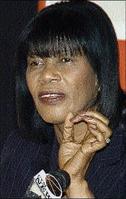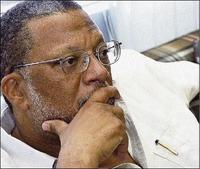
Robert Buddan, Politics of our timeThe People's National Party's (PNP) presidential race two years ago has some similarity with the just-concluded presidential primary race in the Democratic Party of the United States. Peter Phillips was the parallel to Hillary Clinton in the sense that both enjoyed the support of the party establishments. Both had the backing of the superdelegates, at least, those delegates who were members of the legislature. It was thought that the congressional delegates in Clinton's corner would be able to carry the delegates in their districts and attract the necessary funding from the party's financial backers. This is what the Phillips campaign had hoped for in the Jamaican case as well.
In contrast, Portia Simpson Miller and Barack Obama had more in common. They were outsiders to the establishment who had to fight their way in by offering something different to those away from the centre. In the end, they succeeded in capturing enough votes from the parties' grass-roots delegates to become their parties' choice to run for power. They attracted the sympathy of those either suffering exclusion from mainstream policies or those sympathetic to more inclusive policies and a new kind of politics from the centre.
The Clinton/Phillips' similarities go a bit further. Both campaigned on experience and ability to govern. However, while Clinton also campaigned as the person better able to beat the republican candidate, the Portia Simpson Miller camp felt that because of her national popularity, she would stand a better chance of beating the Jamaica Labour Party (JLP) leader.

Opposition Leader Portia Simpson Miller.

Dr Peter Phillips in a reflective mood.
DEMOCRACY AND GOVERNANCE
The Jamaican electorate split their minds on this. They like Portia Simpson Miller more than they like Bruce Golding or Peter Phillips, but they believe Golding would make a better prime minister. The Phillips camp will be taking this message on his behalf as well.
The dilemma in the PNP and the country is the choice between democracy and governance. Portia Simpson Miller was the more democratic choice in the PNP because she was the popular preference by Jamaicans generally and of those who support the PNP. In the end, this is what the ordinary delegates accepted and the superdelegates respected. But the superdelegates had felt that Dr Phillips would make the better leader of government, and the country eventually came to the view that Mr Golding would do better than Mrs Simpson Miller as well. So, is it the democratic choice or the better governor that matters? This is what the delegates have to decide on in September.
Dr Phillips says his campaign does not aim to dishonour the party president, but that it is his duty to accept the invitation from his supporters to lead the party in this time of crisis. Probably he does not hope to beat the party leader on likeability but on qualifications for party leadership and governability. The first of these requires that he shows that he best represents the party's tradition established by Norman and Michael Manley.
brown man, intellectual
Those who do not understand this tradition reduce it to the Drumblair myth that a conspiracy exists in the PNP to ensure that a brown man, intellectual in the image of the Manley's, always be the party leader. It still escapes these people that Simpson Miller won the presidency as a black woman outside of the intellectual tradition of the Manley's.
I am sure Dr Phillips does not see himself as a natural heir to the party leadership on these terms. What he needs to do, however, is explain the party's philosophy and principles that he intends to lead with, and how those of Norman and Michael Manley's days apply to our 21st-century crises. Indeed, as chairman of the committee that refined the party's principles and mission in the 21st Century Mission document at the turn of the century, Dr Phillips has another opportunity to say how that document or its further refinement applies.
Simpson Miller also says that the party must return to its roots, the roots established by the Manleys. She too must explain what this is. After all, the last time Michael Manley was prime minister was in 1992, when the 18-year-old voter of today was two years old. Those between 18 and 35 today do not know or remember much about Michael Manley and recall even less about Norman Manley. But probably she does not even need to resurrect their tradition.
CRISIS OF CONFIDENCE
In June, the Bill Johnson/ Gleaner polls showed that Portia Simpson Miller was 18 percentage points ahead of Peter Phillips as the preferred party leader. Most PNP voters in September 2007 were happy with Portia, and the post-election Meeks report had found that another leader would have lost the elections anyway, and by worse.
Dr Phillips must also say why party delegates and the country should believe he would make a better prime minister than Mrs Simpson Miller and Mr Golding. He has good grounds for saying that this is a time of crisis and Mr Golding's governance is open to criticism. The Bill Johnson/ Gleaner poll of June 2008 says that only 17 per cent of Jamaicans felt that the country was going in the right direction.
country going in the wrong direction
This was a decline of 10 per cent in the 10 months of the Golding administration. Jamaicans listed crime and violence, increased cost of living and need for jobs as the greatest problems that the country faces. When two-thirds of the country, probably the largest ever recorded, feel that the country is going in the wrong direction, PNP leaders must give reasons why things would be better under their government.
The Chamber of Commerce's business and consumer survey showed that by the second quarter of 2008 confidence in the economy had fallen to its lowest in two years. Business people were more uncertain over the future of the economy and about economic policies. The Johnson/Gleaner poll of May/June found, not surprisingly, that the PNP had a six-point lead over the JLP.
All of this shows a crisis of confidence in the administration and the PNP contest must strengthen public confidence that the party's leaders can do better. It is good for the party to settle this unfinished business and then rally around its post-September leader rather than wait until Mr Golding is in a better position to call an election. Like the Democratic Party of the United States and all parties that have open, internal contests for leadership, the PNP will have to get the losers to unite behind the winner. No guaranteed formula for this exists. This will be the first test of leadership.
Today is the last day of the last National Executive Council (NEC) meeting before the annual conference of September 18-21. After today, I suspect, the campaigns will begin. The party has a code of conduct/ethics to guide it but the candidates themselves, president and vice-president, should know above all else that the campaign should be run in a way that all members and supporters close ranks behind the leader. This is the message the NEC should send out at its conclusion because, in the final analysis, that is what Norman and Michael Manley's tradition would insist upon.
Robert Buddan lectures in the Department of Government, UWI, Mona. Email: Robert.Buddan@uwimona.edu.jm or columns@gleanerjm.com.

